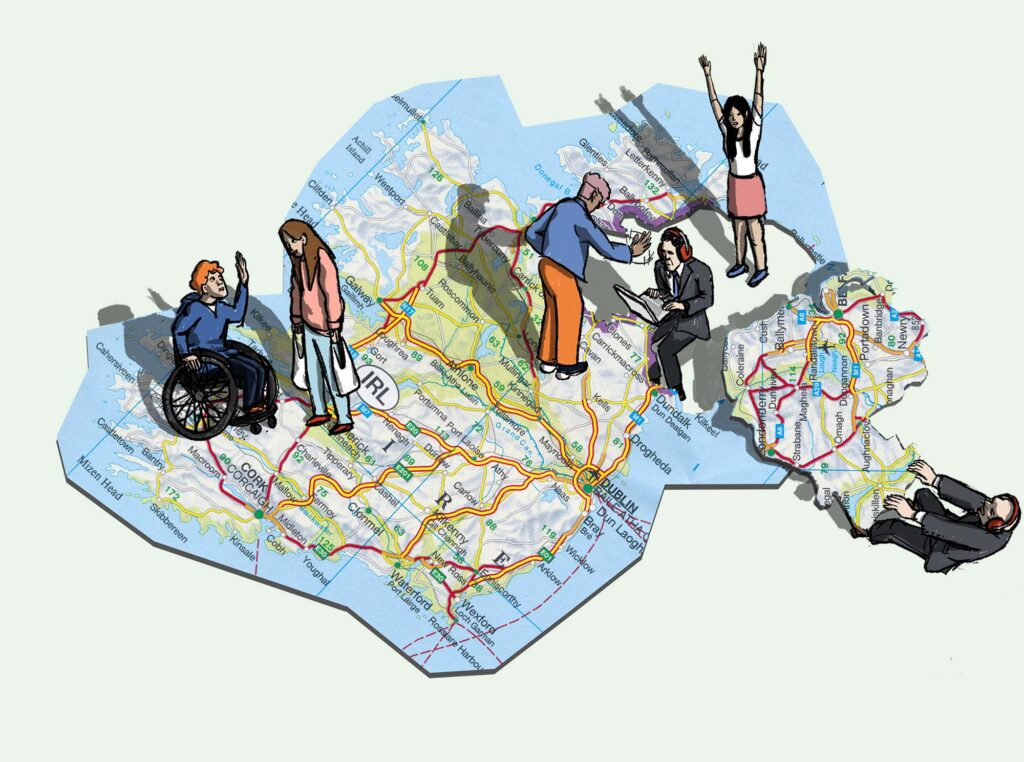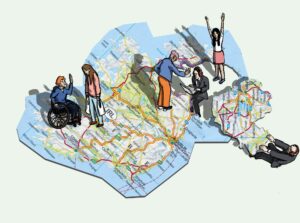Growing up in Northern Ireland’s county Armagh, Tomaí Ó Conghaile was just one kilometre away from the border of the Republic of Ireland, where children typically start learning Irish at age five. But for the first decade of his life, Tomaí says that he barely encountered the language at all. He only started learning Irish in secondary school, becoming fluent at 17 and later working in Irish-language radio. “It was a very natural progression for me to learn the language of my place, but also of my people,” he says.
Around four years ago he moved to Brussels to work as an Irish translator. Back then Irish was only a “treaty language” of the EU, meaning that only the EU’s eight core treaties were translated into Irish. Ireland requested Irish become an official and working EU language in 2007, but also asked to delay it taking full effect until they had enough translators and interpreters. In January 2022 it became a full official language of the EU, equal to its 23 other languages.
It is a historic moment for Gaeilgeoirí (Irish speakers), though they have seen their language being used and abused as a political bargaining chip in their own countries for decades.
Dearg le fearg – Red with anger
In the Republic of Ireland, Irish has been the national and co-official language since 1922. All road signs are bilingual and police officers working in Irish-speaking regions must be able to carry out their duties in the language. Just across the border in Northern Ireland, a part of the United Kingdom, all signs and services are written and conducted only in English.
For most of Northern Ireland’s history, the Irish language has been a battlefront. It was suppressed by a series of unionist governments—mostly Protestants who wanted to keep the region as part of the United Kingdom. Since the language was considered a part of the republican identity—that of Catholics who favoured Irish unification—the government gave little to no recognition or support for teaching the Irish language.
The 1998 Good Friday agreement ended the period of sectarian terrorism known as the Troubles. It established that the Northern Irish government should support the Irish language, though it also required the government to be a coalition of a unionist and a republican party. This means that repeated attempts to make Irish an official language have failed at early stages. In 2016, a unionist politician decided to cut a travel grant for Irish learners. The move proved to be the last straw, collapsing the government of the Democratic Unionist Party (DUP) and Sinn Féin, the republican and democratic socialist political party.
Later that year, a group of millennial teachers, community and youth workers formed An Dream Dearg (the red group), a movement that campaigns for cearta, cothromas agus cóir (rights, respect and recognition) of the Irish language in Northern Ireland. Conchúr Ó’Múadaigh, a spokesperson for the group, says that they are reaching out to younger people from both republican and unionist backgrounds to challenge the sectarianism they still see in politics. “A lot of us want to put our energies into something new,” he says. “We’re here for an Irish language act. We’re here for official status.”
In the six years since its inception, An Dream Dearg has focused on bringing an Irish language act into the mainstream political debate by using social media to bring politicians and journalists on board and holding rallies—their most recent one, in May 2022, took place in Belfast and attracted roughly 17,000 people.
In 2020, the DUP and Sinn Féin once again formed a government together, now with specific plans to grant official status to the Irish language. Two years later the coalition collapsed again. The DUP disagreed with the Northern Ireland Protocol, a post-Brexit agreement negotiated by Boris Johnson’s government and the EU. According to the agreement, Northern Ireland still follows some EU rules when importing goods despite their break with the EU through Brexit. Set in place to avoid a politically-sensitive “hard border” between Northern Ireland and the Republic, the protocol also means that there are some checks for goods travelling between Northern Ireland and the rest of the UK. The DUP says this creates a de facto sea border separating Northern Ireland from the rest of the UK. Ironically, this collapse of the government might finally grant Irish its status as an official language in the country.
An todhchaí – The future
In absence of a Northern Irish government, some lawmaking powers reverted to Brandon Lewis, then the Northern Ireland Secretary of the UK government in Westminster. Seeing that there would be no progress on government formation talks, he introduced the “Identity and Language (Northern Ireland)” bill to make Irish an official language in Northern Ireland in May 2022. The bill has passed through the upper house and is now being debated in Parliament. It will recognise Irish as an official language in Northern Ireland and appoint a language commissioner to advise and monitor its use by public authorities.
In the past, the DUP has said that an Irish language act would help the nationalist Sinn Féin in its plan for Irish unification, since the act would mean that both sides of the border would have similar language policies. Speculation about those unification plans grew this year, as Sinn Féin became the largest party on both sides of the Irish border, with countless newspaper columns wondering if the party would soon plan a referendum on unification. Until now, no Irish government has researched how Irish unification would work, though if elected, Sinn Féin has promised to publish a white paper on Irish unity.
But unification is still unlikely for now. A BBC poll in April 2021 showed that many in Northern Ireland are still against it, though under-40s are split evenly on the issue. Moreover, Sinn Féin and the DUP first need to form a government, which previously took three years of negotiations.
Conchúr Ó’Múadaigh is still sceptical that the Irish language act can become law. “They have politicised this issue for the best part of the last 100 years,” he says. “Until it has a practical use, until we see a commissioner appointed, and until we see services delivered to the community, our campaign will continue.”
An athbheochan – The renaissance
Across the continent, the Irish language is starting to flourish culturally. In February 2022, the Irish-language film An Cailín Ciúin (The Quiet Girl) debuted at this year’s Berlinale and has since become the highest-ever earning Irish-language film. As Covid-19 lockdowns have eased, expats in Paris and Berlin have restarted Irish-language evenings for those wanting to learn or simply chat in Irish.
Back in Brussels, Tomaí Ó Conghaile and the Irish community were able to organise the city’s first Irish-language festival, called Éigse na Bruiséile (cultural gathering of Brussels). Alongside lectures and music gigs in Irish, participants could visit the Royal Museum to view 17th-century manuscripts written in Old Irish.
He says that since becoming an official EU language, the Irish-speaking community in Brussels has experienced a renaissance. “You can really sense that people back home—perhaps new graduates, younger people, younger adults—are realising that there are fantastic opportunities here in Brussels, in the European Union, through your own language,” he says. “Every year, there’s a new wave of people who are interested in these jobs. There’s a new lease of life.”
For now, though, translators from Northern Ireland seem to be able to work for the EU, though not for their own government. “I’m sure some people eventually would like to go back home,” says Ó Conghaile. “Imagine if there was Irish language legislation of this kind, you’d think that there would be more employment opportunities.”
Conchúr Ó’Múadaigh, who grew up seeing Northern Ireland achieve peace, is now raising his children speaking Irish. He hopes that one day he will get a copy of their birth certificates in the language he keeps fighting for.




